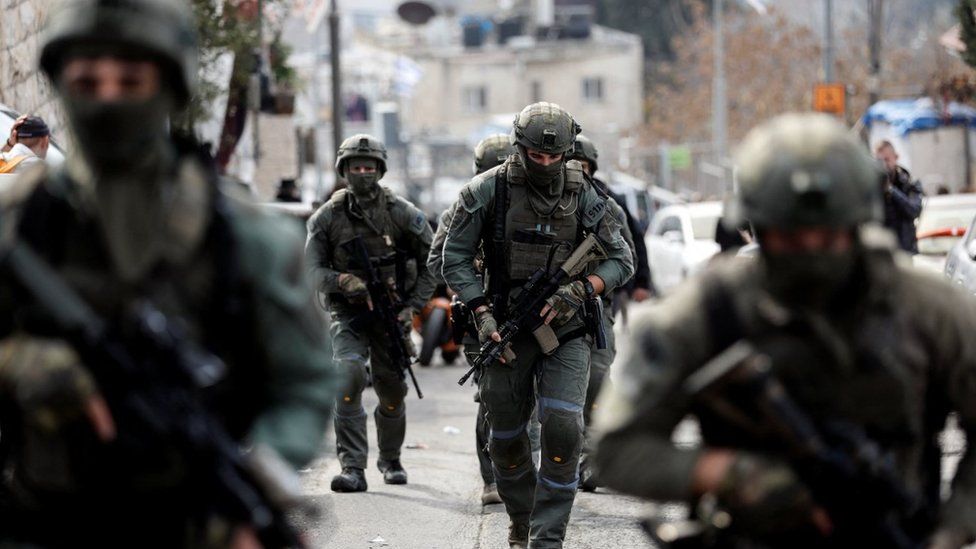Jerusalem shooting: Israel to speed up gun applications after attacks
- Published

Israel's security cabinet has approved measures to make it easier for Israelis to carry guns after two separate attacks by Palestinians in Jerusalem over the past two days.
The attacks took place after an Israeli army raid in the occupied West Bank killed nine people.
The new measures also include depriving an attacker's family members of residency and social security rights.
The full cabinet is due to consider the measures on Sunday.
Prime Minister Benjamin Netanyahu had promised a "strong" and "swift" response ahead of the security cabinet meeting.
Israel's army also said it would be reinforcing troop numbers in the occupied West Bank.
"When civilians have guns, they can defend themselves," the controversial far-right National Security Minister, Itamar Ben-Gvir, told reporters outside a Jerusalem hospital.
The measures will revoke the rights to social security of "the families of terrorists that support terrorism", the security cabinet said.
The proposals are in step with proposals from Mr Netanyahu's far-right political allies, who allowed him to return to power last month.
The announcement came after Israeli police said a 13-year-old Palestinian boy was behind a shooting in Jerusalem's Silwan neighbourhood on Saturday that left an Israeli father and son seriously wounded.
An Israeli police force spokesperson previously said the assailant ambushed five people as they made their way to prayers, leaving two in a "critical condition". The 13-year-old was shot and injured by passers-by and is being held in hospital.
In a separate shooting on Friday at a synagogue in East Jerusalem, seven people were killed and at least three more injured as they gathered for prayers at the start of the Jewish Sabbath. The gunman was shot dead at the scene.
The man behind Friday's synagogue attack was identified by local media as a Palestinian from East Jerusalem.
Police have arrested 42 people in connection with that attack.
Israeli police commissioner Kobi Shabtai called it "one of the worst attacks we have encountered in recent years".
Palestinian militant groups praised the attack, but did not say one of their members was responsible.
Mr Netanyahu called for calm and urged citizens to allow security forces to carry out their tasks, while the military said additional troops would be deployed in the occupied West Bank.
"I call again on all Israelis - don't take the law into your hands," Mr Netanyahu said. He thanked several world leaders - including US President Joe Biden - for their support.
Tensions have been high since nine Palestinians - both militants and civilians - were killed during an Israeli military raid in Jenin in the occupied West Bank on Thursday.
This was followed by rocket fire into Israel from Gaza, which Israel responded to with air strikes.
Since the start of January, 30 Palestinians - both militants and civilians - have been killed in the West Bank.
Palestinian President Mahmoud Abbas suspended its security co-operation arrangements with Israel after Thursday's raid in Jenin.
Friday's synagogue shooting happened on Holocaust Memorial Day, which commemorates the six million Jews and other victims who were killed in the Holocaust by the Nazi regime in Germany.
Ukrainian President Volodymyr Zelensky condemned the attack, saying that one of the victims was a Ukrainian woman.
"Terror must have no place in today's world - neither in Israel nor Ukraine," he said in a tweet.
British Foreign Secretary James Cleverly wrote on Twitter: "To attack worshippers at a synagogue on Holocaust Memorial Day, and during Shabbat, is horrific. We stand with our Israeli friends."
President Joe Biden talked to Mr Netanyahu and offered all "appropriate means of support", the White House said.
Shortly after the incident, Mr Netanyahu visited the site, as did Mr Ben-Gvir.
The controversial national security minister promised to bring safety back to Israel's streets, but there is rising anger that he has not yet done so, the BBC's Yolande Knell in Jerusalem said.
United Nations Secretary-General Antonio Guterres was "deeply worried about the current escalation of violence in Israel and the occupied Palestinian territory", a spokesperson said.
"This is the moment to exercise utmost restraint," UN spokesperson Stephane Dujarric said.
On Saturday, the European Union expressed alarm at heightened tensions and urged Israel to use lethal force only as a last resort.
"The European Union fully recognises Israel's legitimate security concerns - as evidenced by the latest terrorist attacks - but it has to be stressed that lethal force must only be used as a last resort when it is strictly unavoidable in order to protect life," said the EU's chief diplomat, Josep Borrell.
Israel has occupied East Jerusalem since the 1967 Middle East war and considers the entire city its capital, though this is not recognised by the vast majority of the international community.
Palestinians claim East Jerusalem as the future capital of a hoped-for independent state.
Are you affected by the issues discussed here? Share your experiences by emailing haveyoursay@bbc.co.uk.
Please include a contact number if you are willing to speak to a BBC journalist. You can also get in touch in the following ways:
- WhatsApp: +44 7756 165803
- Tweet: @BBC_HaveYourSay
- Upload pictures or video
- Please read our terms & conditions and privacy policy
If you are reading this page and can't see the form you will need to visit the mobile version of the BBC website to submit your question or comment or you can email us at HaveYourSay@bbc.co.uk. Please include your name, age and location with any submission.
- Published27 January 2023
- Published27 January 2023
- Published26 January 2023